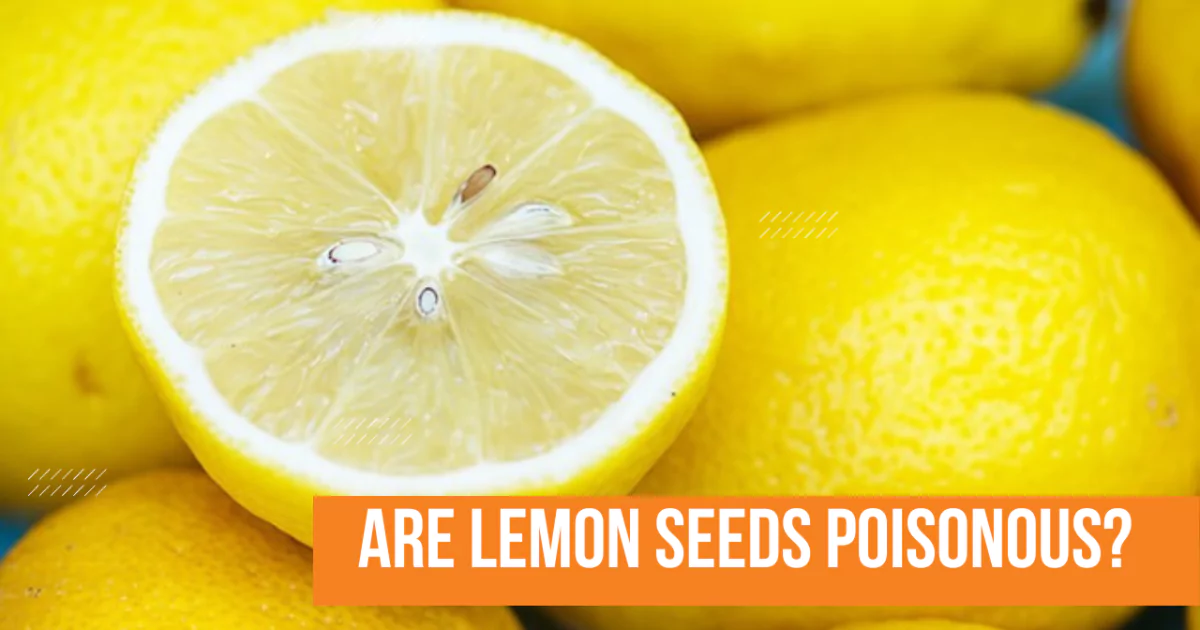Lemons are a popular citrus fruit known for their tangy flavor and numerous health benefits. They are commonly used in cooking, baking, and as a refreshing addition to beverages. While the flesh and juice of lemons are widely consumed, there is often confusion surrounding the safety of consuming lemon seeds. This article aims to answer the question: Are lemon seeds poisonous comprehensively?
Also Read: What Vegetables Should Not Be Juiced
What Are Lemon Seeds Made Of?
Lemon seeds comprise various components, including carbohydrates, proteins, fats, and fiber. They also contain essential minerals such as calcium, phosphorus, and potassium. Also, lemon seeds are rich in vitamins like C and E. These seeds also contain antioxidants that help protect the body against oxidative damage. However, it is essential to note that lemon seeds should not be consumed in large quantities as they may have a bitter taste and can be challenging to digest.
Are Lemon Seeds Harmful?
Lemon seeds are generally considered safe to consume in small quantities and are not harmful to most people. However, it is essential to note that lemon seeds, like other citrus seeds, contain a compound called amygdalin, which can release cyanide when metabolized by the body. Amygdalin in lemon seeds is relatively low, and the human body can typically handle small amounts without any adverse effects.
Some people even consume lemon seeds intentionally for their potential health benefits, such as providing a source of dietary fiber and antioxidants. Nevertheless, avoiding consuming large quantities of lemon seeds or crushing them before consumption is recommended to minimize the risk of cyanide exposure.
Additionally, individuals with certain medical conditions or sensitivities may want to exercise caution and consult a healthcare professional before consuming lemon seeds.
Uses And Benefits When You Consume Lemon Seeds
Lemon seeds, or lemon pips, are often overlooked and discarded when consuming lemons. However, these tiny seeds possess several uses and benefits that can be harnessed when finished.
While lemon seeds are not typically consumed in large quantities, incorporating them into moderation can provide various health benefits. It is important to note that lemon seeds should be consumed raw, as cooking or roasting them may alter their nutritional composition.
Uses of Lemon Seeds
Here are some uses of lemon seeds:
Culinary Uses
Lemon seeds can be used in specific culinary applications to add a unique flavor and texture to dishes. They can be ground into a fine powder and used as a seasoning or spice in marinades, dressings, sauces, and baked goods. The powdered form of lemon seeds can also be sprinkled over salads, soups, or yogurt for an added citrusy taste.
Natural Remedies
Lemon seeds have been traditionally used in various natural remedies due to their potential health benefits. They can be infused in hot water to make a tea believed to aid digestion and relieve bloating. Additionally, lemon seed tea is thought to have diuretic properties and may help flush out toxins from the body.
Beauty and Skincare
Lemon seeds can be utilized in homemade beauty treatments and skincare products. When ground into a fine powder, they can be mixed with other ingredients, such as honey or yogurt, to create facial masks or scrubs. These DIY treatments help exfoliate the skin, remove dead cells, and promote a healthy complexion.
Benefits of Consuming Lemon Seeds
Here are some benefits of lemon seeds:
Nutritional Content
Lemon seeds are a good source of essential nutrients such as fiber, vitamin C, vitamin E, folate, potassium, and antioxidants. Fiber aids in digestion and helps maintain bowel regularity, while vitamin C supports immune function and collagen synthesis. Vitamin E is known for its antioxidant properties, which help protect cells from damage caused by free radicals.
Digestive Health
Lemon seeds contain significant dietary fiber, which is crucial in maintaining a healthy digestive system. Fiber adds bulk to the stool, promoting regular bowel movements and preventing constipation. It also acts as a prebiotic, nourishing beneficial gut bacteria and supporting overall gut health.
Antioxidant Properties
Lemon seeds are rich in antioxidants, including vitamin C and vitamin E. These antioxidants help neutralize harmful free radicals in the body, reducing oxidative stress and inflammation. By combating oxidative damage, lemon seeds may contribute to the prevention of chronic diseases such as heart disease, cancer, and neurodegenerative disorders.
How To Consume Lemon Seeds?
Lemon seeds are often overlooked and discarded when consuming lemons, but they can be destroyed and offer various health benefits. However, it is essential to note that lemon seeds have a bitter taste and a tough outer shell, which may not appeal to everyone.
If you still wish to consume lemon seeds, you can try a few methods. It is essential to remember that moderation is vital, as excessive consumption of lemon seeds may have adverse effects.
Grinding Lemon Seeds
One standard method of consuming lemon seeds is grinding them into powder. This can be done using a coffee grinder or a mortar and pestle. Here’s a step-by-step guide on how to consume lemon seeds by grinding them:
- Start by collecting the lemon seeds from fresh lemons. Rinse them thoroughly to remove any dirt or debris.
- Spread the bases on a clean or paper towel and let them dry completely.
- Once dried, transfer the seeds to a coffee grinder or mortar and pestle.
- Grind the seeds until they turn into a fine powder.
- You can consume powdered lemon seeds directly by adding them to your food or beverages. However, remember that the bitter taste may affect the flavor of your dish or drink.
Infusing Lemon Seed Tea
Another way to consume lemon seeds is by infusing them in hot water to make tea. Lemon seed tea is believed to have detoxifying properties and can be enjoyed as a warm beverage. Here’s how you can make lemon seed tea:
- Collect the lemon seeds from fresh lemons and rinse them thoroughly.
- Bring a pot of water to a boil.
- Add the cleaned lemon seeds to the boiling water.
- Allow the seeds to simmer in the water for about 10-15 minutes.
- Remove the pot from heat and strain the tea to remove the seeds.
- You can add honey or lemon juice to enhance the flavor, as lemon seed tea can be pretty bitter.
Incorporating Lemon Seeds into Recipes
If you prefer a more subtle way of consuming lemon seeds, you can incorporate them into various recipes. Here are a few ideas:
- Lemon Seed Dressing: Grind lemon seeds and mix them with olive oil, lemon juice, salt, and pepper to create a tangy dressing for salads or roasted vegetables.
- Lemon Seed Smoothie: Blend lemon seeds with your favorite fruits, yogurt, and a sweetener to make a nutritious smoothie.
- Lemon Seed Baked Goods: Add ground lemon seeds to your muffin or cake batter for an extra zesty flavor.
Side Effects Of Lemon Seeds
Here are some side effects of lemon seeds you need to know:
Choking Hazard
One of the primary concerns associated with consuming lemon seeds is the risk of lemon seed stuck in the throat and then choking. Lemon seeds are tiny and can quickly become lodged in the throat, especially in young children or individuals with swallowing difficulties. To minimize this risk, removing the seeds before consuming lemons or any lemon-based products is advisable.
Toxicity
Lemon seeds contain small amounts of amygdalin, which can break into cyanide when ingested. However, the levels of amygdalin in lemon seeds are generally very low and unlikely to cause harm when consumed in moderation. The human body has natural detoxification mechanisms that can handle small amounts of cyanide. Excessive consumption of lemon seeds could lead to cyanide poisoning, although this is extremely rare.
Digestive Issues
Some individuals may experience digestive discomfort after consuming lemon seeds. This can include symptoms such as bloating, gas, stomach pain, or diarrhea. These digestive issues may be more likely if many lemon seeds are consumed, or an individual has a sensitive digestive system.
Are Lemon Seeds Good For Digestive Problems?
Lemon seeds are not typically recommended as a remedy for digestive problems. While lemons have some digestive benefits, such as stimulating the production of digestive juices and aiding in detoxification, the seeds are not commonly consumed.
Lemon seeds contain amygdalin and cyanogenic glycosides, which can release cyanide when ingested in large amounts. Cyanide is a toxic substance that can harm the body, particularly in high doses.
Therefore, it is generally advised to avoid consuming lemon seeds. Instead, if you are experiencing digestive issues, it is recommended to focus on other dietary and lifestyle changes that promote good digestion, such as eating a balanced diet rich in fiber, staying hydrated, managing stress levels, and seeking medical advice if necessary.
FAQs
Are Lemon Seeds Toxic To Dogs?
No, lemon seeds are not toxic to dogs. However, they can pose a choking hazard or cause digestive issues if consumed in large quantities.
Which Fruit Seeds Are Poisonous?
Several fruit seeds are known to be poisonous if consumed in large quantities or specific ways. Some examples include apple seeds, cherry pits, and apricot kernels.
Can You Eat Lemon Skin?
Yes, lemon skin is safe to eat and can be consumed in various ways, such as zesting or adding it to recipes.
Are Lemon Seeds Digestible?
Lemon seeds are generally not easily digestible due to their tough outer coating, but they can pass through the digestive system without causing harm.
What Happens If I Accidentally Swallow Lemon Seeds?
If you accidentally swallow lemon seeds, they will most likely pass through your digestive system without causing any harm.
How Many Lemon Seeds Can I Eat In A Day?
You can eat lemon seeds in moderation as part of a balanced diet, but limiting your intake to a few sources per day is recommended.
Can You Grow Lemons From Dried Lemons Seeds?
Yes, it is possible to grow lemon trees from dried lemon seeds. However, the success rate may vary as dried seeds have a lower germination rate than fresh seeds.
Are Lemon Seeds Edible?
Yes, lemon seeds are edible but are not typically consumed due to their bitter taste and tough texture.
Conclusion
In conclusion, while lemon seeds contain small amounts of potentially harmful compounds, they are generally safe for consumption in moderation. As with any food, practicing restraint and listening to your body’s needs and sensitivities is essential.

![Olive Oil and Lemon Juice - [ Health Benefits & Uses] Olive Oil and Lemon Juice](https://juicerhunter.com/wp-content/uploads/2023/10/Discover-the-benefits-of-olive-oil-and-lemon-juice-150x150.jpg)




